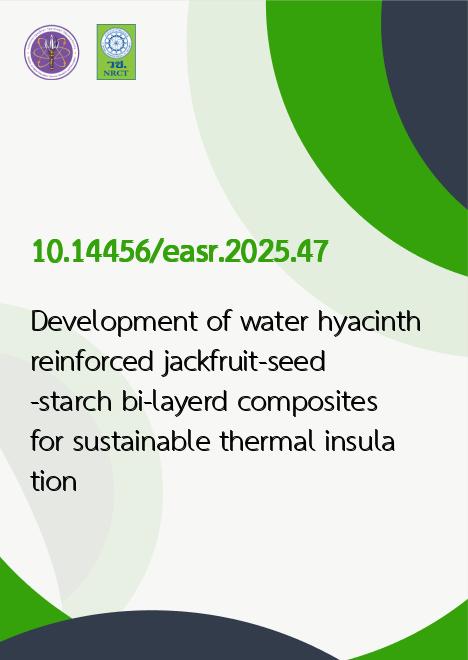
|
Development of water hyacinth reinforced jackfruit-seed-starch bi-layerd composites for sustainable thermal insulation |
|---|---|
| รหัสดีโอไอ | |
| Creator | Tornado Roy |
| Title | Development of water hyacinth reinforced jackfruit-seed-starch bi-layerd composites for sustainable thermal insulation |
| Contributor | Sushama Roy, Amlan Roy, Champa Rani Mistry, Maharani Roy |
| Publisher | Faculty of Engineering, Khon Kaen University |
| Publication Year | 2568 |
| Journal Title | Engineering and Applied Science Research |
| Journal Vol. | 52 |
| Journal No. | 5 |
| Page no. | 524-531 |
| Keyword | Water hyachinth composites, Jackfruit seed starch, Biocomposites, Thermal insulation, Biodegradable composites |
| URL Website | https://ph01.tci-thaijo.org/index.php/easr/index |
| Website title | Engineering and Applied Science Research |
| ISSN | 2539-6161 |
| Abstract | This study investigates the development of biodegradable composite materials using water hyacinth pulp and jackfruit-seed-starch as a binder, aimed at providing an eco-friendly solution for thermal insulation applications. The composites were fabricated using a compression molding process with varying starch contents (10%, 20%, 30%, and 40%) under controlled temperature and pressure. Mechanical properties such as tensile strength, flexural strength, impact strength, hardness, and thermal conductivity were evaluated. The results indicated that composites with 30% jackfruit seed starch exhibited the best mechanical performance, including tensile and flexural strength, along with favorable thermal conductivity. However, water absorption remained a challenge, with higher starch content leading to increased moisture uptake. The findings highlight the potential of these composites for thermal insulation, particularly in extremely cold countries, where they could serve as a sustainable alternative to conventional materials. Further studies are needed to reduce water absorption and enhance the durability of the composites for long-term use. |